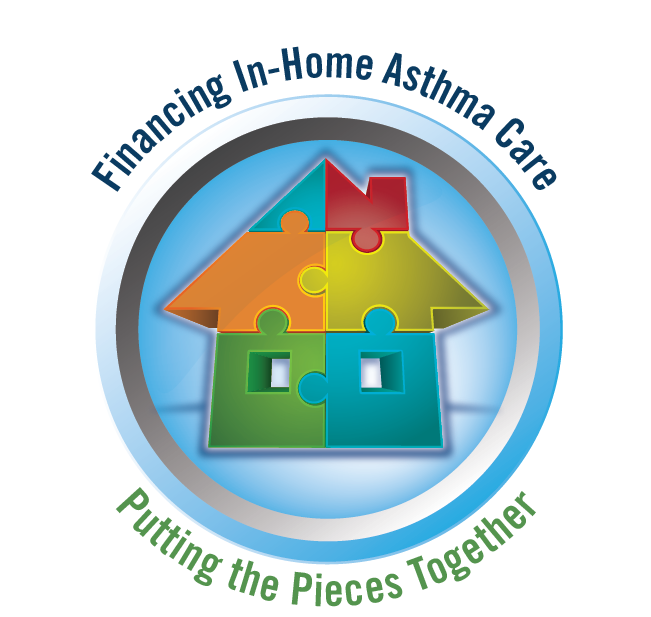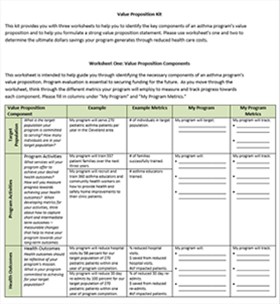
Health care policy change is opening new avenues to sustainable financing for in-home asthma care. To benefit, programs need to not only be ready to make the case for why their services should get reimbursed but also what to pay for and how—their value, their costs, and their business model.
Expressing your program’s value and requesting reimbursement for your costs requires that you understand and can express clearly and quantitatively who you serve, what you deliver, and what that costs and that you can describe with some precision the benefits and value that your services deliver to both your clients and your funders. There are tools here to help you do it all.
Developing Your Program's Value Proposition
 Your Program Value Proposition should tell a powerful story about why your program is worth funding and what investors can expect to earn in return for their investment. Developing your Value Proposition will help to prepare your program for reimbursement and new funding. Learn how to talk about your program's impact using real cost and health care savings data and how to use available evidence to prepare your unique story.
Your Program Value Proposition should tell a powerful story about why your program is worth funding and what investors can expect to earn in return for their investment. Developing your Value Proposition will help to prepare your program for reimbursement and new funding. Learn how to talk about your program's impact using real cost and health care savings data and how to use available evidence to prepare your unique story.
View an example of a program Value Proposition from Kalamazoo County, Michigan, and learn about the steps Jennifer Kosak, the Program Director, took to prepare it.
Strengthen Data Collection & Evaluation
Asthma Return on Investment (ROI) Calculator
Agency for Healthcare Research and Quality
The Asthma Return On Investment (ROI) Calculator helps State leaders estimate the financial benefits of asthma quality improvement programs in their state. The calculator combines information from the literature with real-world data about patients to estimate the net impact of an asthma care quality improvement program.
The Medical Expenditure Panel Survey
The Medical Expenditure Panel Survey (MEPS) is the most complete source of data on the cost and use of health care and health insurance coverage. MEPS includes data on access to health are, children's health, health care costs and expenditures, health care disparities, health insurance, and state and metro area estimates, among other data. MEPS can be a great resource to help you estimate elements of your value proposition.
Webinar: Data to Dollars: 2015 Award Winners Share Their Stories
Ruth Ann Norton, Green & Healthy Homes Initiative and Susan Steppe, Le Bonheur Children's Hospital, 2015
This webinar presents ideas on ways to enhance asthma program sustainability by attracting funders using compelling data storytelling. Hear relevant approaches from the 2015 National Environmental Leadership Award in Asthma Management winners on compiling and analyzing data to demonstrate the effectiveness of your asthma program to public and private funders.
Podcast Episode 1: Program Evaluation
Maureen Wilce and Sarah Gill, CDC and Karen Meyerson, Asthma Network of West Michigan, 2013
Hear about evaluation methods that systematically improve and account for public health actions and outcomes. This episode explores how data and measurable results can be used to demonstrate value.
More Resources
Building Systems to Sustain Home-Based Asthma Services
National Center for Healthy Housing (NCHH)
Advance your efforts to institute or expand availability of sustainable home-based asthma services using this eLearning platform. Learn how best to communicate the demonstrated health outcomes and financial benefits of your program to decision makers by engaging with the eLearning module "Making the Business Case." View Module 2 Excerpt: Making the Case Your Funders Want and Need to Hear.
NCHH provides Case studies and Resources where you can find studies describing multiple programs that have demonstrated their value and made their case persuasively to a variety of funders and have succeeded in securing reimbursement for in-home services.